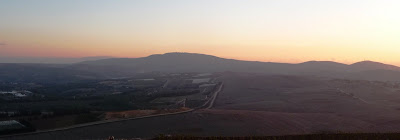Two weeks ago, during the four day week-end for Aid Al-Adha (a major Muslim holiday), two friends, H. and K., and I were invited by a Lebanese acquaintance, Kh., to go on a two-day road trip in the South (Al-Janub), where he is originally from, down to the frontier with Israel*.
So early on Sunday morning, the four of us cram ourselves and our bags into Kh.'s old red Volkswagen Golf on our way to Saida.
If you know a little about contemporary Lebanese history, "The South" is also known as "Hezbollah Land," a portion of Lebanon more or less outside of Lebanese government control and administrated by the Shi'a Party of God (literal translation of "Hezb-Allah"), and the site of the 2006 war with Israel. Depending on who I would talk to, the South was either someplace I absolutely needed to go or had to avoid at all costs. "You'll be kidnapped!" some said. "Hezbollah people are crazy, you can't go there as a foreigner!"
 |
| The Hezbollah flag. |
In short, there was no way I could turn down an opportunity to see this for myself.
Saida, also known as Sidon, is the third largest city in Lebanon, and at the "border," so to speak, with South Lebanon. It is a predominantly Sunni agglomeration, and the hometown of the Hariri family. While Saida is not on our list of landmarks to visit, it is a necessary halt before proceeding any further. As foreigners, we need to check in with the Mukhabarat ("Secret Police," NOT to confuse, as I did—repeatedly—with “mukhadarat,” which means "drugs").
We arrive at the Mukhabarat office, where we are greeted by men in plainclothes, who tell us they need photocopies of our passports. No problem, we say, we brought our passports! Ah, except it appears that the Mukhabarat does not have a photocopier. So we are left to our own devices, searching throughout an unknown city for a place that could possibly be open on a holiday weekend with a photocopier. After stopping at half a dozen closed stores in the space of an hour, it looks like our trip might just end there, until we miraculously find a store willing to make (high quality! color!) photocopies. We proudly return to the Mukhabarat office, where, after maybe ten minutes of small talk, we get the pass we desperately needed: an underwhelming Post-It-sized piece of paper with a phone number in case of emergency.
So back in the car we go, finally ready to see the border with Israel for the first time from the top of Maroun al-Ras, a town which was under Israeli occupation from 1985 to 2000.
 |
| from left: Israel, the border, Lebanon. |
I regard myself as someone with a—for local standards—relatively moderate and detached view on the Arab-Israeli conflict, if such a thing is considered possible... but this, this was something else. I cannot explain what it felt like taking in the view of Israel, no longer in my television screen, so close, yet so far. The contrast between the two states was striking: on one side—the other side—green fields as far as the eye can see; the border, a narrow dirt road separated on either side by wire fences; and the Lebanese side, gray and rocky, rough and uninviting
We could see cars in Israel. We could see cars. It is so hard to convey how extraordinary it was, the calmness, the ordinariness of it all from where we were standing. An ordinariness that South Lebanon doesn't have. Can't have.
I had been to a recent former war zone once before, in Bosnia, in 2005, ten years after the Srebrenica massacre. The reminders of war were subtle: a lone bullet hole in a wardrobe door; my host casually mentioning he had lost his sense of hearing in one ear from an explosion.
But in the South … The conflict with Israel may have ended five years ago, but the wounds are still fresh, and can’t heal. How can they heal, when peace feels more like a temporary truce until someone, something, sparks another confrontation? How can they heal, when so many vast expanses of land, including the ones right on the border, are completely unusable because still covered in landmines? What an oddly apocalyptic mentality one can have, living each day passing by Hezbollah rockets pointed towards Israel by the side of the road, abandoned Israeli tanks exhibited as trophies of war. It’s quite a shock, entering this world, being slapped in the face by your absolute privilege of not coming from a conflict zone, of being able to turn off the TV when the images become too much. It’s humbling.
This is not to say what I saw was a traumatized population. Far, far from that. But it is one that has had to adapt to circumstances I couldn’t fathom living with on a daily basis. Even children’s games are not immune. Playing Jews and Arabs with realistic plastic guns instead of cowboys and Indians doesn't have the same carefree connotation to my outsider eyes. It’s a sad feeling that’s hard to shake off.
(to be continued.)
*As you can guess, the Israeli-Arab conflict is a particularly hot topic here, as is the use of the word "Israel" versus "Palestine" or "Occupied Palestinian Territories." It is not my intent to make a political statement for either side of the issue here, but I chose to use the word "Israel" when referring to the territory that is recognized as such by the UN, because, well, I don't want to get myself into this debate, and the UN is always a great scapegoat for everything.
 |
| "Palestine Occupée" |
 |
| The border, still. |





No comments:
Post a Comment